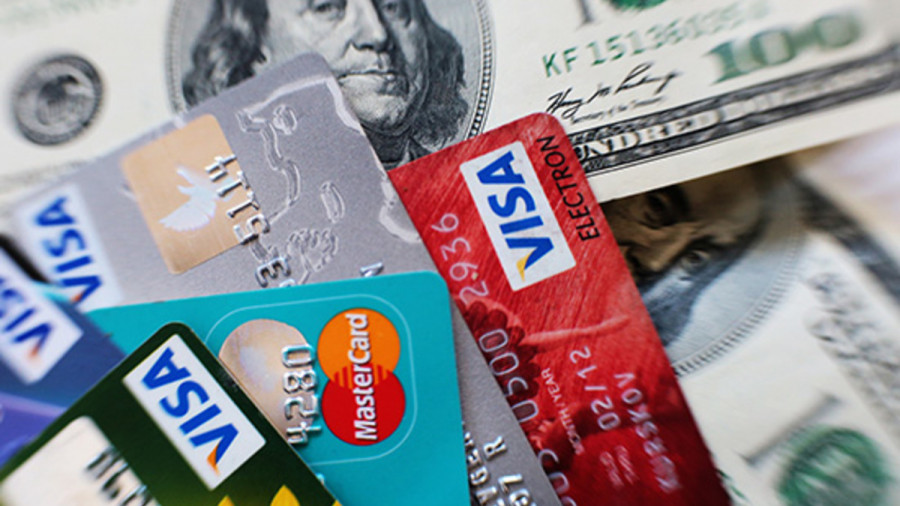US consumer debt loads grew in 2021 by the largest amount in 14 years as people ramped up borrowing to afford homes, cars and other goods that are becoming more expensive.
According to New York Fed researchers, the increase in borrowing was partly due to rising prices, as consumers struggle to get along with the highest inflation in almost four decades.
"The aggregate balances of newly opened mortgage and auto loans sharply increased in 2021, corresponding to increases in home and car prices," Wilbert Van Der Klaauw, senior vice president at the New York Fed, said in a statement.
Over $4.5 trillion in mortgages were originated in 2021, reaching a historic high for the database, which goes back to 1999. Mortgage balances increased by $258 billion in the fourth quarter to $10.93 trillion at the end of December.
Auto loan originations returned to pre-pandemic trends but loan amounts increased in response to rising car prices, New York Fed researchers said. "As car prices have soared, buyers have borrowed more to finance the additional cost," researchers wrote in a separate blog post published on Tuesday.
Some borrowers anticipating higher interest rates may also be taking advantage of lower borrowing costs, researchers said, noting an increase in mortgage refinancing.
Notably, the Fed is expected to hike interest rates in March as well as reduce balance sheet assets later this year. Both actions could increase borrowing costs as the Fed works to curb inflation and remove support offered during the pandemic.
Despite the figures, the researchers' view is confidently optimistic. Households, supported by increased savings and higher incomes, seem to be coping well with the greater debt burden so far.
Total household debt grew by $1 trillion last year, marking the largest increase in overall debt since 2007, according to the New York Fed's quarterly report on household debt and credit. The total debt balance is now $1.4 trillion higher than it was at the end of 2019.
In 2007, this level of borrowing prevented an increase in collateral and led to a major global financial crisis.
One would believe in the optimism of the analysts if we could be convinced by the figures that Americans have bought more property over the past 14 years and are now able to provide more liquidity than before. However, according to research, the Millennial generation has become poorer than their parents in every way - from the size of homeownership to more credit than their predecessors. Consumer confidence levels in the States are also falling, reflected in a reallocation of purchases towards havens.
So where do ordinary Americans get the reserves to cope with inflation and recession? It is unlikely that they are seeking refinancing opportunities at financial institutions with more lenient lending conditions because of the high quality of their lives.
In a sign that consumers are returning to their pre-pandemic spending habits, credit card balances also increased by $52 billion in the fourth quarter. That marked the largest quarterly increase observed in the history of the data, but credit card balances are still $71 billion lower than they were at the end of 2019.
Credit card use typically rises in the fourth quarter as people make holiday purchases, but the increase could also reflect higher prices for goods and services, researchers said.
According to the researchers, households in aggregate have so far been able to absorb the higher debt loads and delinquencies remain low, thanks in part to savings accumulated earlier in the pandemic and forbearance programs.
"The economy is recovering, incomes are up and households have the capacity to add debt," Tim Duy, a University of Oregon professor and the chief economist of SGH Macro Advisers, said.
The share of disposable income that households spend on rent, loan payments, taxes and other bills is low by historical standards, Duy said.
Still, some borrowers that haven't fared well during the pandemic could have a harder time keeping up with their debt payments later, New York Fed researchers said.
It will be important to watch how some borrowers fare after they need to resume student loan debt payments in a few months, they said.
However, I believe that the rise in card savings reflects Americans' anxiety about prices and, in many cases, an attempt to save for a down payment on real estate, which is still in high demand as a traditional safe haven from inflation.
Of course, the economic situation is changing dynamically. But the sheer volume of borrowing is frightening, making one wonder what the outcome will be.
Eventually a serious bubble in the real estate market, triggered by attempts to protect against inflation, could be the first to play against Americans if housing values start to fall and consumers are required to provide additional collateral, which, judging by the volume of debt, is not and will not be available any time soon.











